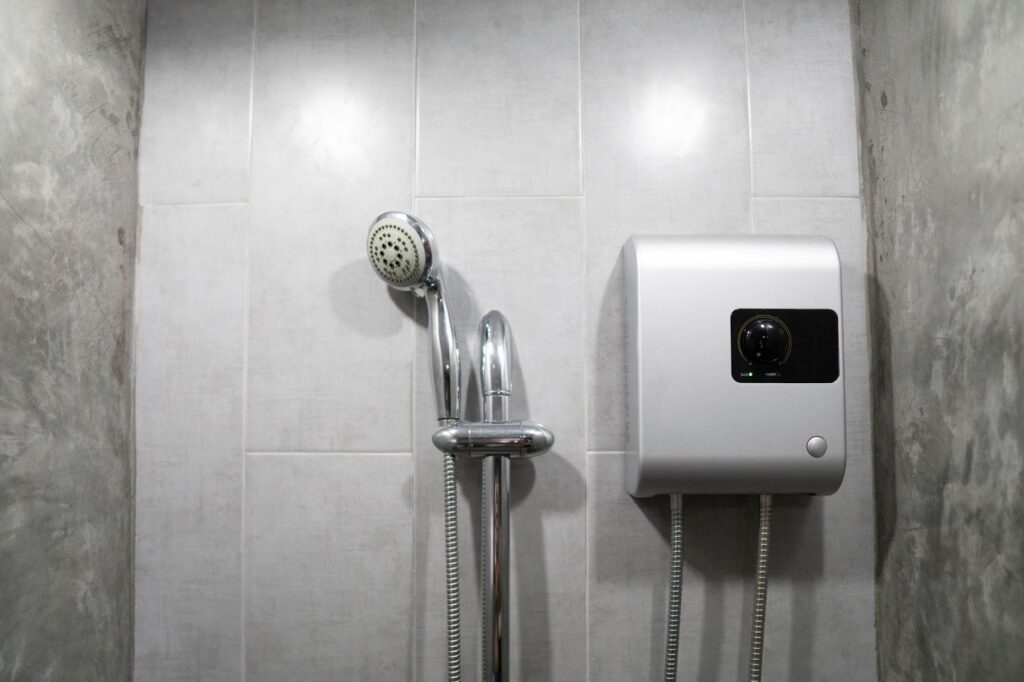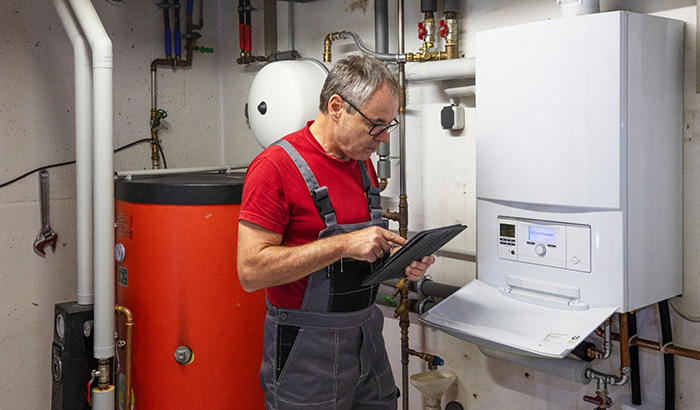The concept of a tankless water heater is simple: it’s a device that heats water for various household needs. The tankless water heater is a revolutionary appliance that offers several advantages over traditional tank-based systems.
Let’s delve into what a tankless water heater is, the pros and cons of one, and why you might want to consider installing one in your home.
How Does a Tankless Water Heater Work?
Understanding the inner workings of a tankless water heater will help you decide whether it’s the right choice for your home. Let’s delve into the step-by-step process:
Activation and Initial Flow
- Sensor Activation: When you turn on a hot water tap, the flow sensor within the tankless water heater detects the movement of water and activates the unit.
- Cold Water Inflow: Cold water flows into the unit and passes through a heat exchanger.
The Heating Process
- Choice of Heating Element: Tankless water heaters are either electric or gas-powered. Electric units use electric resistance coils, while gas units use a natural gas burner for heating.
- Heat Exchanger: The heat exchanger is a crucial component that transfers heat from the electric element or gas burner to the water. This is where the term “instantaneous” comes from heating the water on the spot as it flows through the unit.
Output and Flow Rate
- Constant Supply: One of the standout features of tankless water heaters is their ability to deliver a continuous hot water supply. You don’t have to wait for a storage tank to fill up with hot water, which is a common issue with traditional water heaters.
- Flow Rate Limitations: Typically, tankless water heaters provide hot water at a rate of 2–5 gallons per minute. Gas-fired models generally offer higher flow rates compared to electric ones. However, even the largest gas-fired models may struggle to supply enough hot water for simultaneous, multiple uses in large households.
Overcoming Flow Rate Limitations
- Multiple Units: To address the issue of limited flow rate, you can install two or more tankless water heaters in your home. This ensures that multiple appliances or fixtures can receive hot water simultaneously.
- Dedicated Units for Appliances: Another option is to install separate tankless water heaters for specific appliances that consume a lot of hot water, such as clothes washers or dishwashers. However, this solution will increase the initial installation cost and may need to be more cost-effective in the long run.
Energy-Saving Standby Mode
- Sensor Deactivation: When you turn off the hot water tap, the flow sensor detects the cessation of water flow and deactivates the heating element, putting the unit into energy-saving standby mode.
By understanding these details, you will better understand the efficiency and limitations of a tankless water heater. Its on-demand functionality not only provides instant hot water but also contributes to energy efficiency, albeit with some considerations regarding flow rate and the potential need for multiple units.
Tankless Water Heater Pros and Cons
Before switching to a tankless system, weighing a tankless water heater’s pros and cons is essential.
Advantages
- Energy Efficiency: Tankless water heaters are generally more energy-efficient because they only heat water when it’s needed, reducing energy losses associated with maintaining a hot water tank.
- Space-Saving: These units are compact and can be wall-mounted, freeing up valuable floor space.
- Longevity: Tankless water heaters often have a longer lifespan compared to traditional tank water heaters.
- Continuous Hot Water: They provide an endless supply of hot water.
- Water Quality: There is less chance of rust and scale buildup, which can affect water quality over time.
- Lower Operational Costs: Although the initial investment is higher, the lower energy costs can make it more cost-effective in the long run.
- Eco-Friendly: Lower energy consumption means a smaller carbon footprint.
Disadvantages
- Initial Cost: The upfront cost of purchasing and installing a tankless water heater is generally higher.
- Limited Flow Rate: Tankless systems may struggle to supply multiple fixtures simultaneously.
- Retrofitting Challenges: Additional plumbing or electrical work may be required.

Why You May Need a Tankless Water Heater?
Choosing a water heater is a significant decision that impacts your daily life and long-term finances. Given the pros and cons of tankless water heaters, here are some scenarios where you might benefit from this technology:
- For Large Families or High-Usage Scenarios
- Multiple Users: In households with multiple family members, the demand for hot water is often high, especially during peak hours like mornings and evenings. A tankless water heater provides an endless supply of hot water, ensuring that everyone can enjoy a hot shower without running out.
- High-Volume Applications: If your home has a large soaking tub, a high-flow shower system, or other high-usage hot water applications, a tankless system may be a lifesaver.
- Space-Constrained Homes
- Small Apartments: In smaller homes or apartments where space is at a premium, the compact design of a tankless water heater is a huge advantage. These units are able to be wall-mounted, freeing up valuable floor space.
- Additional Installations: If you have a detached garage, workshop, or pool house that needs hot water, a small tankless unit may be an ideal solution without taking up much space.
- Eco-Conscious Individuals
- Lower Carbon Footprint: If you’re environmentally conscious, the energy efficiency of a tankless water heater will help reduce your carbon footprint. These units are generally more energy-efficient than their tank-based counterparts.
- Sustainability: Some tankless water heaters have eco-friendly features like recirculation pumps that save water and energy.
- Long-Term Homeowners
- Investment Perspective: If you plan to stay in your home for years, the long-term energy savings can offset the higher initial cost of a tankless water heater.
- Property Value: Energy-efficient appliances like tankless water heaters also add to the resale value of your home.
- Quality Concerns
- Water Purity: Traditional water heaters can accumulate rust and scale inside the tank, affecting water quality. Tankless water heaters have less of this risk, providing cleaner water for your household.
- Safety Features: Many tankless systems have advanced safety features like precise temperature control preventing scalding.
- High Energy Bills
- Cost Savings: If your energy bills are high due to an inefficient water heating system, switching to a tankless system might result in significant savings over time.
- Utility Rebates: Some local utilities offer rebates for installing energy-efficient appliances, including tankless water heaters, which further offset the initial cost.
- Water Heater Service and Replacement
- Aging Systems: If your current water heater is old, inefficient, or nearing the end of its lifespan, it might be time to consider a more efficient and durable option.
- Frequent Repairs: If you find yourself frequently calling for water heater service and repairs, it may be more cost-effective to replace the old unit with a more reliable tankless system.
By considering these factors, you can make an informed decision on whether a tankless water heater and its benefits are the right choice for your specific needs and lifestyle.
Preventive Measures for Using Hard Water with Tankless Systems:
A common concern with any water heater is the risk of damage, or shorter life spans due to hard water buildup. There are ways to accommodate for hard water to keep your water heater, tankless or not, running well. Here is how to protect your tankless water heater from hard water:
- Water Softeners: Installing a water softener can help prevent scale buildup by removing minerals from the water before it enters the tankless water heater.
- Regular Maintenance: Some tankless water heaters come with built-in scale detection and a user-friendly descaling process. Routine maintenance, including descaling, can help prolong the life of the unit.
- Pre-Filter: Installing a pre-filter also helps by removing larger particles from the water before it enters the heating unit.
- Professional Inspection: It’s advisable to have your tankless water heater inspected by a professional, especially if you have hard water. The professional will assess the level of scale buildup and recommend appropriate action.
- Check Manufacturer Guidelines: Always refer to the manufacturer’s guidelines regarding hard water. Some models are better equipped to handle hard water than others.
- Warranty: Be aware that some manufacturers may void the warranty if the unit is damaged due to scale buildup from hard water.
Using hard water with a tankless water heater is possible, but it requires additional preventive measures to maintain the unit’s efficiency and longevity.
Install a Tankless Water Heater With Pando Plumbing
A tankless water heater offers several advantages over traditional systems, from energy efficiency to space-saving designs. While they come with a higher initial cost, the long-term benefits often outweigh the disadvantages. If you’re considering a new water heater, a tankless system could be the right choice for you.
Use Pando Plumbing to receive a free estimate, where one of our certified tankless water heater plumbers will come to your home and evaluate the problem or area to provide you with an accurate estimate. Pando Plumbing also doesn’t charge extra in the event of an emergency, even if it’s on the weekend or late at night. We want to provide you with excellent customer and water heater service.
Get an estimate or book an appointment to install a tankless water heater with Pando Plumbing.




